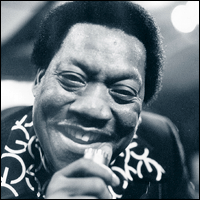![[Sidebar]](/standard/image/sidebar.gif)
![[Music Reviews]](/standard/image/headers/music_reviews_header.gif)
| clubs by night | club directory | bands in town | concerts | hot links | reviews & features |
Heavenly mix
Germany's Trikont label
by Douglas Wolk
Bobby "Blue" Bland
My latest musical obsession is Trikont Records, a German label whose releases have just started to trickle into America. Trikont was founded in 1971 as part of a leftist publishing house and gradually evolved into a full-on record label; the dozen or so discs listed in the English-language section of its Web site (http://www.trikont.de) are all from the last few years. The Trikont releases I've heard sound like Heaven's own mix tapes: compilations made by somebody with an impossibly comprehensive record collection and an impeccable sense of sequencing.Take Down & Out: The Sad Soul of the Black South. Now, compilations of soul-on-a-bummer aren't a new thing. Just a few months ago, Hip-O released two discs' worth of Broken-Hearted Soul Essentials, albums that cast their net a little wide, partly because they're concerned more with hits than hearts. Smokey Robinson's "The Tracks of My Tears," for instance, has a splendid lyric about being sad, but its presentation isn't exactly miserable, and in the case of Klymaxx's "I Miss You," it's hard to imagine actual emotion coming into the song at any stage.
Trikont's take on the theme, by contrast, is incredibly intense. The songs collected on Down & Out aren't just sad, they're shuddering with despair. They're all Southern, blues-inflected soul, of a kind that produced a lot of regional hits but rarely charted nationally, all recorded between the late '50s and early '70s, and all ruthless tearjerkers. When Dicky Williams starts a song, "In the same motel/I didn't know I was next door to my woman/Till I heard her yell," you know you're about to get wrung out to dry. (A few songs are miserable enough that they're kind of hilarious -- for example, Don Varner's "He Kept On Talking," where the narrator hears a stranger at a party go on about a new lover who turns out to be the narrator's wife.)
Not too many of Down & Out's performers are famous anymore (Bobby "Blue" Bland is the biggest name here), maybe because they can't meet the feel-good requirements of oldies radio. Take Ede Robin's "Dead": she sings for a bit under a minute about being abandoned, wanting to die, and the razor in her hand; then there's a minute and a half more of instrumental groove and we're done. Try playing that next to "Dancing in the Streets."
Another Trikont disc, American Yodeling 1911-1946, investigates a phenomenon you just don't hear much any more, though it used to be huge. The liner notes call yodeling "the Esperanto of the multicultural jungle," which makes sense for an Alpine Swiss singing technique that became first a standard of black American vaudeville and then drifted into country music -- only six of Jimmie Rodgers's songs didn't include yodels, and the Carter Family, Bill Monroe, and Bob Wills all appear on the compilation. (Rodgers, the man most responsible for yodeling's mass popularity, is represented here by "Standin' on the Corner," his epochal collaboration with Louis Armstrong.) The most impressive yodeling on the album comes from the forgotten likes of the DeZurik Sisters, Chicago residents who were among the first prominent women in country music.
And then there's the extraordinary Ho! #1: Roady Music from Vietnam. Assembled by an enthusiastic, goofy Austrian team that goes by the name Nuoc Mam Dirndl'n, it's an examination of how music intersects with everyday life in Vietnam. Pure "world music" or carefully thought-out fusion this is not. It's more like rubbernecking at a real-time cultural collision, an untidy but fantastically energetic mix of Vietnamese instrumentation and singing techniques, Western tunes and beats ("Bát Ghen" is recognizable as the theme from Bonanza), and the exigencies of ultra-low budgets (open-air performance, super-cheap synthesizers). The most thrilling tracks offer Vietnamese funeral music: frenetic, out-of-tune drum-and-horn ensembles banging away at standards like "One Ship Will Come."
Music about death seems to be a Trikont specialty. (The one traditional "tribute album" in its catalogue is dedicated to Hank Williams, the most fatalistic of great songwriters; called I'll Never Get Out of This World Alive, it includes Hank covers by the likes of Al Green, Link Wray, and Killdozer.) The two volumes of the exceptionally morbid Dead & Gone are, once again, stylish, surprising, and fascinating. One disc includes "funeral marches," most of them by brass bands from around the world but with some ringers like Tom Waits and Robert Wyatt. The other, scarier one has "songs about death." Some of its tracks are obvious picks, like Billie Holiday's "Strange Fruit"; others aren't so obvious. The Geto Boys' hip-hop scream "I Just Wanna Die" is chilling enough on its own, but sandwiched between tracks by Cassandra Wilson and Diamanda Galás, it's horrifying. If I'm translating the Web site correctly, Trikont has also released Finnish tango music, music by the great Cameroonian composer Francis Bebey, and the standard-to-end-all-standards, "La Paloma." I hope I don't have to go to Heaven to hear them.
| home page | what's new | search | about the phoenix | feedback |
Copyright © 2000 The Phoenix Media/Communications Group. All rights reserved.
